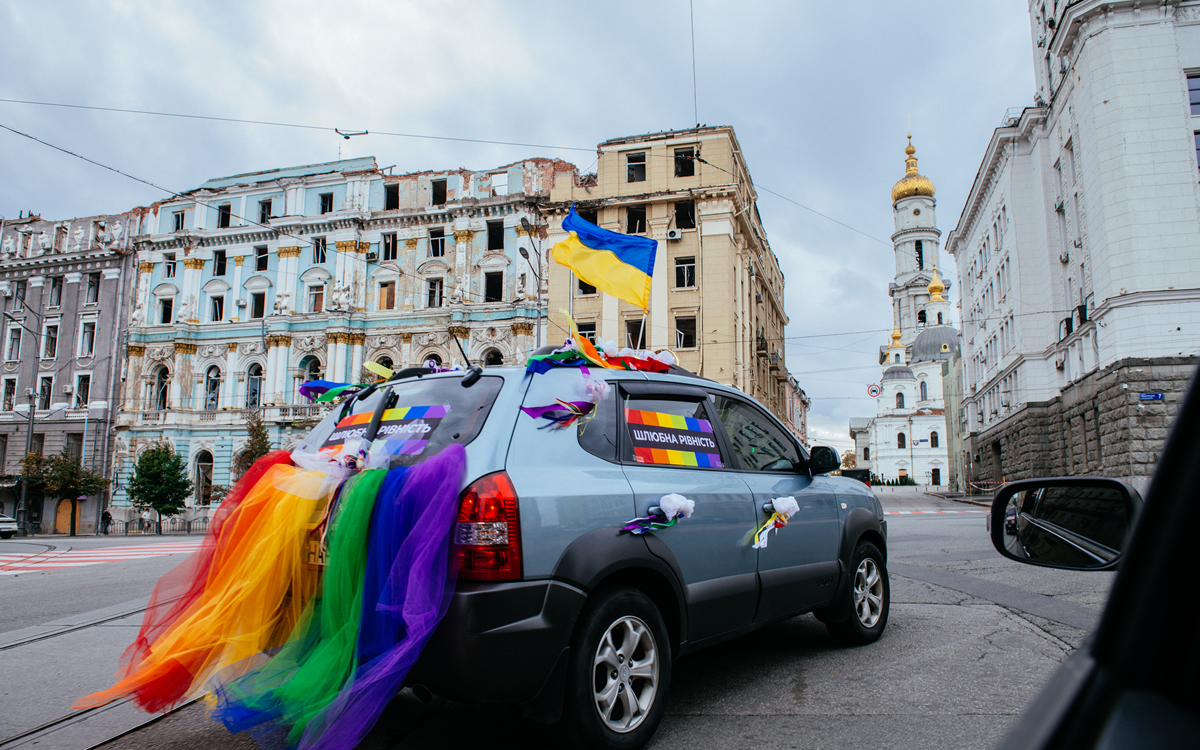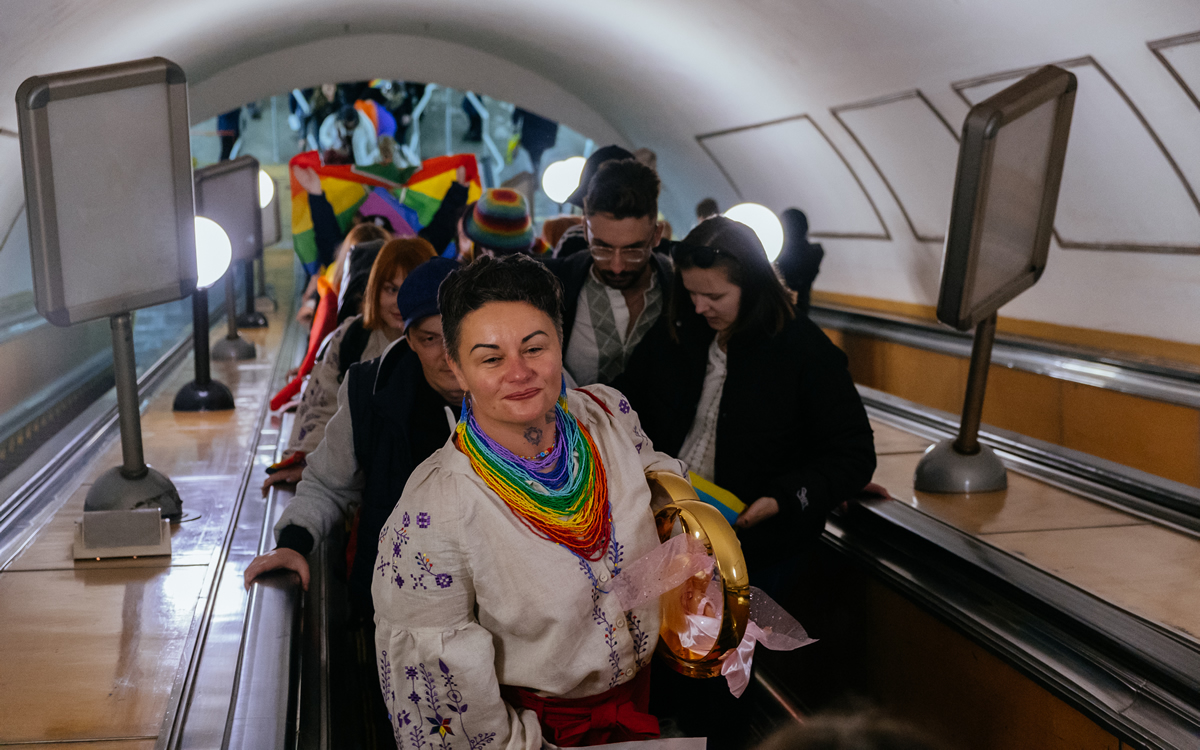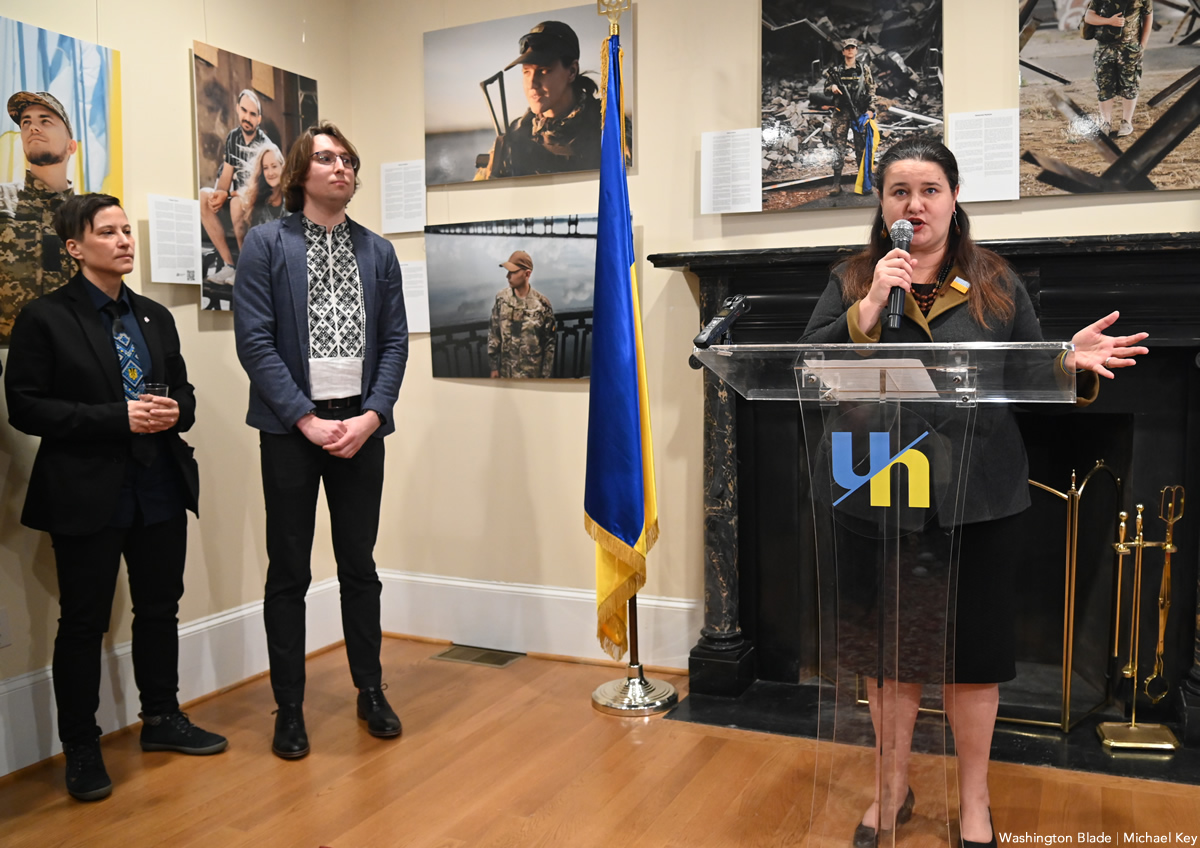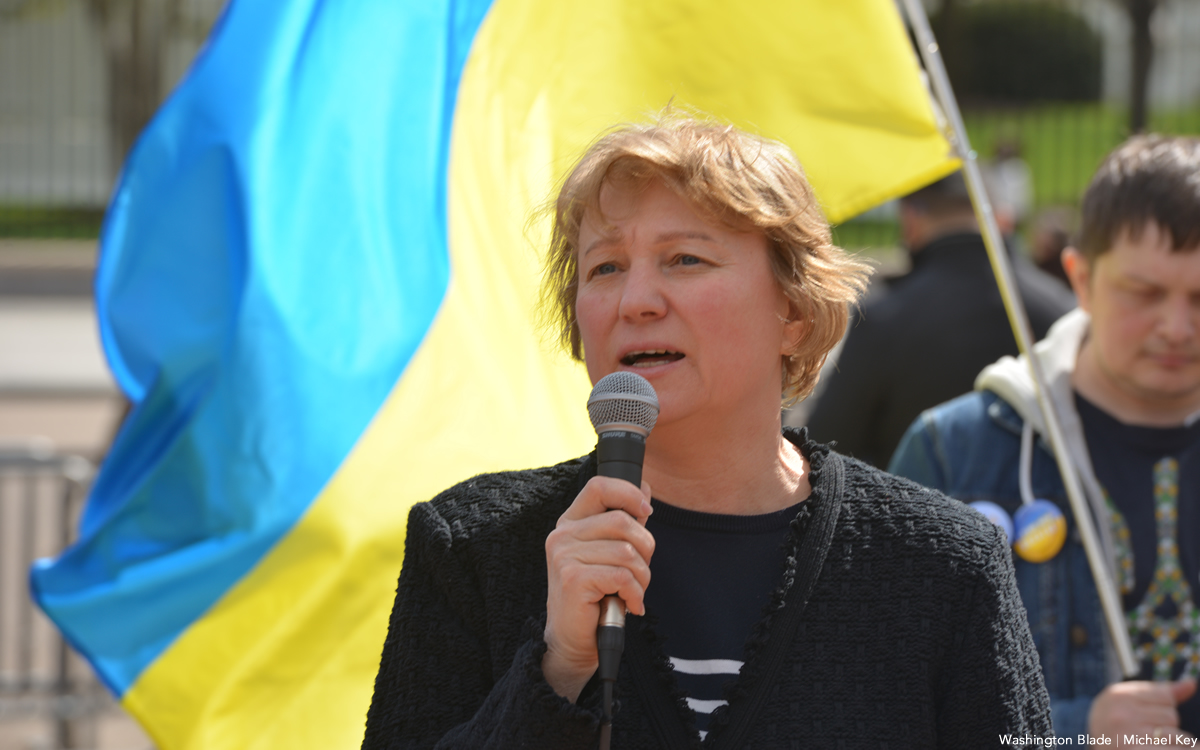World
‘I love Ukraine’
Country’s activists remain defiant as they mark war’s first anniversary

Anna Sharyhina, co-founder of the Sphere Women’s Association, a group that promotes LGBTQ and intersex rights in Ukraine, on Sept. 25, 2022, led a Pride march in a subway station in Kharkiv, the country’s second-largest city that is less than 30 miles from the Russian border in eastern Ukraine.
Kharkiv Pride took place during the Ukrainian military’s counteroffensive against Russian troops in Kharkiv Oblast. Sphere Fundraising Manager Ruslana Hnatchenko on Tuesday told the Washington Blade during a Zoom interview the subway was the only safe place for the event to happen, but she said it was “very important for us to have it in Ukraine and have it in Kharkiv.”
“Kharkiv carries a significance of being at the frontline and it is so close to Russia,” said Hnatchenko. “It was great to have it there.”

Friday marks one year since Russia launched its war against Ukraine.
Dmitry Shapoval, a gay man with HIV from Kyiv, the Ukrainian capital, and Anastasiia Baraniuk and her partner, Yulia Mulyukina, who were living together from Dniptro, a city on the Dnieper River in central Ukraine, are among the millions of people who have left Ukraine over the last year.
Hnatchenko was in Budapest, Hungary, studying for her master’s degree when the war began, and she spoke with the Blade from there. She visited her family over the Christmas holidays, but they met in Lviv, a city in western Ukraine that is close to the country’s border with Poland, because it was safer than Kharkiv.
“It was unsafe for me to come to Kharkiv,” said Hnatchenko. “It would be better for everyone to meet in the west.”
A Russian airstrike on March 1, 2022, killed Elvira Schemur, a 21-year-old law school student who was a volunteer for Kharkiv Pride and Kyiv Pride. Schemur was volunteering inside Kharkiv’s regional administration building when she was killed.
Hnatchenko said activists in Kherson, a city that Ukrainian forces liberated last November, told her Russian soldiers “were aware of where people from vulnerable groups (LGBTQ and intersex people and Roma people) lived.” Hnatchenko told the Blade people who identified as LGBTQ, intersex or nonbinary did not go outside during the occupation because they were afraid of being forcibly conscripted, attacked or sexually assaulted.
“A lot of LGBT people just tried not to go outside … and obviously not to expose anything about their identity,” she said.
Hnatchenko also told the Blade women and girls in Kherson tried to dress in a “non-attractive way” in order “to make themselves look ugly, so the troops would take less interest in them.”
‘We help our soldiers’
Activists and advocacy groups remain defiant. They also continue to support LGBTQ and intersex Ukrainians who remain inside the country and servicemembers.
Hnatchenko said Sphere has provided humanitarian assistance and psychological support to more than 1,500 people.
Outright International, RFSL (the Swedish Federation for Lesbian, Gay, Bisexual, Transgender, Queer and Intersex Rights), Hivos and private donors inside Ukraine and elsewhere have donated funds that have allowed Sphere to purchase generators, clothes and blankets that it has distributed to Kharkiv’s LGBTQ and intersex residents during blackouts that Russia’s attacks against Ukrainian infrastructure have caused.
The U.S. Agency for International Development and the President’s Emergency Plan for AIDS Relief over the last year have delivered millions of doses of antiretroviral drugs for Ukrainians with HIV/AIDS. Then-Kyiv Pride Executive Director Lenny Emson last month during a photo exhibit at Ukraine House in D.C. that highlighted Ukrainian LGBTQ and intersex servicemembers noted the organization continues to purchase basic supplies for them.
“We buy shoes. We buy underwear. We buy socks. We buy heaters,” said Emson. “We help our soldiers.”
Ukrainian President Volodymyr Zelenskyy over the last year has indicated his support of LGBTQ and intersex rights.
Zelenskyy last summer said he supports a civil partnerships law for same-sex couples.
Ukrainian lawmakers late last year unanimously approved a media regulation bill that will ban hate speech and incitement based on sexual orientation and gender identity. The measure passed days before Zelenskyy, a former actor and comedian, met with President Joe Biden at the White House and addressed Congress.
Zelenskyy last month made a broad reference to LGBTQ and intersex rights in a virtual Golden Globes appearance. Ukrainian Ambassador to the U.S. Oksana Markarova during the Jan. 26 event in D.C. applauded Kyiv Pride and other LGBTQ and intersex rights groups in her country.
“Thank you for everything you do in Kyiv, and thank you for everything that you do in order to fight the discrimination that still is somewhere in Ukraine,” said Markarova. “Not everything is perfect yet, but you know, I think we are moving in the right direction. And we together will not only fight the external enemy, but also will see equality.”

Biden on Feb. 20 met with Zelenskyy in Kyiv.
Hnatchenko told the Blade she thinks Zelenskyy “does believe in human rights.”
“Maybe he’s not a full-blown ally, yet, but I think he believes in human rights,” she said, while noting she was sharing her personal thoughts about Zelenskyy. “He’s not only doing that because of the pressure from partners, but there’s pressure from within Ukraine to not do that.”
Hnatchenko further acknowledged conservative politicians, prominent figures within the Ukrainian and Russian Orthodox Churches and many Ukrainians themselves remain opposed to LGBTQ and intersex rights.
“He (Zelenskyy) is kind of between a rock and a hard place in that sense, but I believe that human rights in Ukraine will overcome, especially after our victory,” said Hnatchenko. “We will make progress.”
Helen Globa, co-founder of Tergo, a support group for parents and friends of LGBTQ and intersex Ukrainians, on March 2, 2022, left her apartment in the Kyiv suburb of Bucha. She lived in New York with her son, Bogdan Globa, and his husband until she returned to Ukraine last August.
Helen Globa, like Hnatchenko, acknowledged many Ukrainians remain opposed to LGBTQ and intersex rights, but she said Zelenskyy’s support of civil unions for same-sex couples and LGBTQ and intersex Ukrainians in the country’s armed forces are two tangible results of activists’ work in the country. Helen Globa also said one of the reasons she decided to return to Ukraine was to continue her support of these efforts.
“I love Ukraine and my life, my activities,” she told the Blade on Wednesday. “I do believe in our victory and further opportunities to finish my LGBTQ human rights activities by pushing our government to adopt same-sex partnership and marriages.”

Sarah Ashton-Cirillo, a transgender woman from Las Vegas who enlisted in the Ukrainian military after she covered the war, echoed Helen Globa.
“This act of war by Putin has set in motion a timely and irreversible civil rights movement in Ukraine, one that has been extraordinarily beneficial to the LGBTQ community,” Ashton-Cirillo told the Blade on Tuesday from the frontlines where she is fighting with the 209th Battalion of the 113th Brigade in the Donbas. “From hundreds of openly queer men and women serving in the Armed Forces of Ukraine to President Zelenskyy’s positive statement about civil partnerships and human rights as applied to the community, what Putin has done has allowed freedom to bloom in Ukraine.”
Books
New book profiles LGBTQ Ukrainians, documents war experiences
Tuesday marks four years since Russia attacked Ukraine

Journalist J. Lester Feder’s new book profiles LGBTQ Ukrainians and their experiences during Russia’s war against their country.
Feder for “The Queer Face of War: Portraits and Stories from Ukraine” interviewed and photographed LGBTQ Ukrainians in Kyiv, the country’s capital, and in other cities. They include Olena Hloba, the co-founder of Tergo, a support group for parents and friends of LGBTQ Ukrainians, who fled her home in the Kyiv suburb of Bucha shortly after Russia launched its war on Feb. 24, 2022.
Russian soldiers killed civilians as they withdrew from Bucha. Videos and photographs that emerged from the Kyiv suburb showed dead bodies with their hands tied behind their back and other signs of torture.

Olena Shevchenko, chair of Insight, a Ukrainian LGBTQ rights group, wrote the book’s forward.

The book also profiles Viktor Pylypenko, a gay man who the Ukrainian military assigned to the 72nd Mechanized Black Cossack Brigade after the war began. Feder writes Pylypenko’s unit “was deployed to some of the fiercest and most important battles of the war.”
“The brigade was pivotal to beating Russian forces back from Kyiv in their initial attempt to take the capital, helping them liberate territory near Kharkiv and defending the front lines in Donbas,” wrote Feder.
Pylypenko spent two years fighting “on Ukraine’s most dangerous battlefields, serving primarily as a medic.”
“At times he felt he was living in a horror movie, watching tank shells tear his fellow soldiers apart before his eyes,” wrote Feder. “He held many men as they took their final breaths. Of the roughly one hundred who entered the unit with him, only six remained when he was discharged in 2024. He didn’t leave by choice: he went home to take care of his father, who had suffered a stroke.”
Feder notes one of Pylypenko’s former commanders attacked him online when he came out. Pylypenko said another commander defended him.
Feder also profiled Diana and Oleksii Polukhin, two residents of Kherson, a port city in southern Ukraine that is near the mouth of the Dnieper River.
Ukrainian forces regained control of Kherson in November 2022, nine months after Russia occupied it.
Diana, a cigarette vender, and Polukhin told Feder that Russian forces demanded they disclose the names of other LGBTQ Ukrainians in Kherson. Russian forces also tortured Diana and Polukhin while in their custody.
Polukhim is the first LGBTQ victim of Russian persecution to report their case to Ukrainian prosecutors.

Feder, who is of Ukrainian descent, first visited Ukraine in 2013 when he wrote for BuzzFeed.
He was Outright International’s Senior Fellow for Emergency Research from 2021-2023. Feder last traveled to Ukraine in December 2024.
Feder spoke about his book at Politics and Prose at the Wharf in Southwest D.C. on Feb. 6. The Washington Blade spoke with Feder on Feb. 20.
Feder told the Blade he began to work on the book when he was at Outright International and working with humanitarian groups on how to better serve LGBTQ Ukrainians. Feder said military service requirements, a lack of access to hormone therapy and documents that accurately reflect a person’s gender identity and LGBTQ-friendly shelters are among the myriad challenges that LGBTQ Ukrainians have faced since the war began.
“All of these were components of a queer experience of war that was not well documented, and we had never seen in one place, especially with photos,” he told the Blade. “I felt really called to do that, not only because of what was happening in Ukraine, but also as a way to bring to the surface issues that we’d had seen in Iraq and Syria and Afghanistan.”

Feder also spoke with the Blade about the war’s geopolitical implications.
Russian President Vladimir Putin in 2013 signed a law that bans the “promotion of homosexuality” to minors.
The 2014 Winter Olympics took place in Sochi, a Russian resort city on the Black Sea. Russia annexed Crimea from Ukraine a few weeks after the games ended.
Russia’s anti-LGBTQ crackdown has continued over the last decade.
The Russian Supreme Court in 2023 ruled the “international LGBT movement” is an extremist organization and banned it. The Russian Justice Ministry last month designated ILGA World, a global LGBTQ and intersex rights group, as an “undesirable” organization.
Ukraine, meanwhile, has sought to align itself with Europe.
Ukrainian President Volodymyr Zelenskyy after a 2021 meeting with then-President Joe Biden at the White House said his country would continue to fight discrimination based on sexual orientation and gender identity. (Zelenskyy’s relationship with the U.S. has grown more tense since the Trump-Vance administration took office.) Zelenskyy in 2022 publicly backed civil partnerships for same-sex couples.
Then-Ukrainian Ambassador to the U.S. Oksana Markarova in 2023 applauded Kyiv Pride and other LGBTQ and intersex rights groups in her country when she spoke at a photo exhibit at Ukraine House in D.C. that highlighted LGBTQ and intersex soldiers. Then-Kyiv Pride Executive Director Lenny Emson, who Feder profiles in his book, was among those who attended the event.
“Thank you for everything you do in Kyiv, and thank you for everything that you do in order to fight the discrimination that still is somewhere in Ukraine,” said Markarova. “Not everything is perfect yet, but you know, I think we are moving in the right direction. And we together will not only fight the external enemy, but also will see equality.”
Feder in response to the Blade’s question about why he decided to write his book said he “didn’t feel” the “significance of Russia’s war against Ukraine” for LGBTQ people around the world “was fully understood.”
“This was an opportunity to tell that big story,” he said.
“The crackdown on LGBT rights inside Russia was essentially a laboratory for a strategy of attacking democratic values by attacking queer rights and it was one as Ukraine was getting closet to Europe back in 2013, 2014,” he added. “It was a strategy they were using as part of their foreign policy, and it was one they were using not only in Ukraine over the past decade, but around the world.”
Feder said Republicans are using “that same strategy to attack queer people, to attack democracy itself.”
“I felt like it was important that Americans understand that history,” he said.
Netherlands
Rob Jetten becomes first gay Dutch prime minister
38-year-old head of government sworn in on Monday

Rob Jetten on Monday became the Netherland’s first openly gay prime minister.
Jetten’s centrist D66 party won the country’s elections last October, narrowly defeating Geert Wilders’ far-right Party for Freedom.
King Willem-Alexander on Monday swore in Jetten, who is also the country’s youngest-ever prime minister. The Associated Press notes Jetten’s coalition government includes the center-right Christian Democrats and the center-right People’s Party for Freedom and Democracy.
“Proud to be able to do this together,” said Jetten in an X post before Willem-Alexander swore him in.
COC Nederland, a Dutch LGBTQ advocacy group, in a statement said Jetten “becoming prime minister shows that your sexual orientation doesn’t have to matter.”
“You can become a construction worker, a doctor, a lawyer, and even prime minister,” said COC Nederland.
The advocacy group noted Jetten has said his government will implement its “Rainbow Agreement” that include calls for strengthening nondiscrimination laws “to better protect transgender and intersex people,” appointing more “discrimination investigators … to address violence against LGBTQ+ people and other minorities,” and introducing measures “to promote acceptance in schools.”
“COC will hold the Cabinet to that promise,” said COC Nederland.
Jetten’s fiancé is Nicolás Keenen, an Argentine field hockey player who competed in the 2024 Summer Olympics in Paris.
Jetten is one of two openly gay heads of government: Andorran Prime Minister Xavier Espot Zamora came out in 2023. Gay Latvian President Edgars Rinkēvičs, who is the country’s head of state, took office in 2023.
Leo Varadkar, who was Ireland’s prime minister from 2017-2020 and from 2022-2024, and Xavier Bettel, who was Luxembourg’s prime minister from 2013-2023, are gay. Ana Brnabić, who was Serbia’s prime minister from 2017-2024, is a lesbian.
Former Icelandic Prime Minister Jóhanna Sigurðardóttir in 2009 became the world’s first openly lesbian head of government. Former Belgian Prime Minister Elio Di Rupo, former San Marino Captain Regent Paolo Rondelli, and former French Prime Minister Gabriel Attal are also openly gay.
Colombian presidential candidate Claudia López, who is the former mayor of Bogotá, the Colombian capital, would become her country’s first female and first lesbian president if she wins the country’s presidential election that is taking place later this year.
Ecuador
Justicia reconoce delito de odio en caso de bullying en Instituto Nacional Mejía de Ecuador
Johana B se suicidó el 11 de abril de 2023

A casi tres años del suicidio de Johana B., quien estudió en el Instituto Nacional Mejía, colegio emblemático de Quito, el Tribunal de la Corte Nacional de Justicia ratificó la condena para el alumno responsable del acoso escolar que la llevó a quitarse la vida.
Según información de la Fiscalía, el fallo de última instancia deja en firme la condena de cuatro años de internamiento en un centro para adolescentes infractores, en una audiencia de casación pedida por la defensa del agresor, tres meses antes de que prescriba el caso.
Con la sentencia, este caso es uno de los primeros en el país en reconocer actos de odio por violencia de género, delito tipificado en el artículo 177 del Código Orgánico Penal Integral (COIP).
El suicidio de Johana B. ocurrió el 11 abril de 2023 y fue consecuencia del acoso escolar por estereotipos de género que enfrentó la estudiante por parte de su agresor, quien constantemente la insultaba y agredía por su forma de vestir, llevar el cabello corto o practicar actividades que hace años se consideraban exclusivamente para hombres, como ser mando de la Banda de Paz en el Instituto Nacional Mejía.
Desde la muerte de Johana, su familia buscaba justicia. Su padre, José, en una entrevista concedida a edición cientonce para la investigación periodística Los suicidios que quedan en el clóset a causa de la omisión estatal afirmó que su hija era acosada por su compañero y otres estudiantes con apodos como “marimacha”, lo que también fue corroborado en los testimonios recogidos por la Unidad de Justicia Juvenil No. 4 de la Fiscalía.
Los resultados de la autopsia psicológica y del examen antropológico realizados tras la muerte de Johana confirmaron las versiones de sus compañeras y docentes: que su agresor la acosó de manera sistemática durante dos años. Los empujones, jalones de cabello o burlas, incluso por su situación económica, eran constantes en el aula de clase.
La violencia que recibió Johana escaló cuando su compañero le dio un codazo en la espalda ocasionándole una lesión que le imposibilitó caminar y asistir a clases.
Días después del hecho, la adolescente se quitó la vida en su casa, tras escuchar que la madre del agresor se negó a pagar la mitad del valor de una tomografía para determinar la lesión en su espalda, tal como lo había acordado previamente con sus padres y frente al personal del DECE (Departamento de Consejería Estudiantil del colegio), según versiones de su familia y la Fiscalía.
#AFONDO | Johana se suicidó el 11 de abril de 2023, tras ser víctima de acoso escolar por no cumplir con estereotipos femeninos 😢.
Dos semanas antes, uno de sus compañeros le dio un codazo en la espalda, ocasionándole una lesión que le imposibilitó caminar 🧵 pic.twitter.com/bXKUs9YYOm
— EdicionCientonce (@EdCientonce) September 3, 2025
“Era una chica linda, fuerte, alegre. Siempre nos llevamos muy bien, hemos compartido todo. Nos dejó muchos recuerdos y todos nos sentimos tristes; siempre estamos pensando en ella. Es un vacío tan grande aquí, en este lugar”, expresó José a Edición Cientonce el año pasado.
Para la fiscal del caso y de la Unidad de Justicia Juvenil de la Fiscalía, Martha Reino, el suicidio de la adolescente fue un agravante que se contempló durante la audiencia de juzgamiento de marzo de 2024, según explicó a este medio el año pasado. Desde entonces, la familia del agresor presentó un recurso de casación en la Corte Nacional de Justicia, que provocó la dilatación del proceso.
En el fallo de última instancia, el Tribunal también dispuso que el agresor pague $3.000 a la familia de Johana B. como reparación integral. Además, el adolescente deberá recibir medidas socioeducativas, de acuerdo al artículo 385 del Código Orgánico de la Niñez y Adolescencia, señala la Fiscalía.
El caso de Johana también destapó las omisiones y negligencias del personal del DECE y docentes del Instituto Nacional Mejía. En la etapa de instrucción fiscal se comprobó que no se aplicaron los protocolos respectivos para proteger a la víctima.
De hecho, la Fiscalía conoció el caso a raíz de la denuncia que presentó su padre, José, y no por el DECE, aseguró la fiscal el año pasado a Edición Cientonce.
Pese a estas omisiones presentadas en el proceso, el fallo de última instancia sólo ratificó la condena para el estudiante.




















